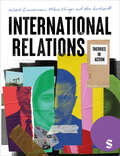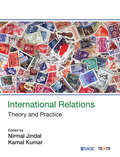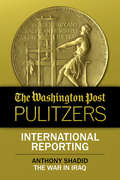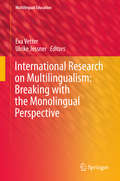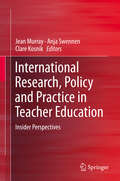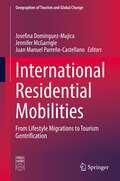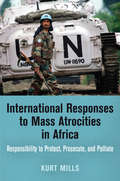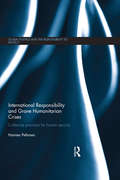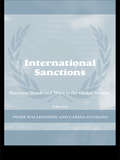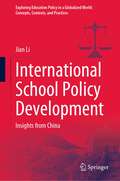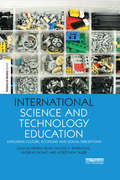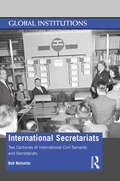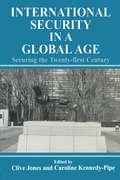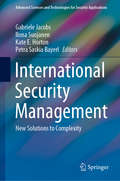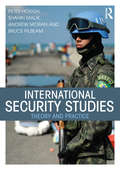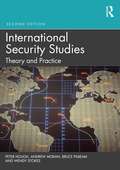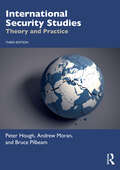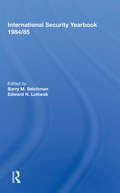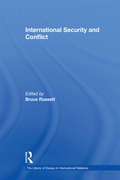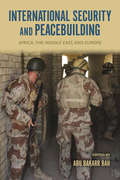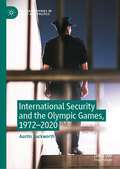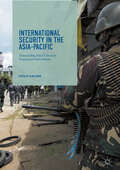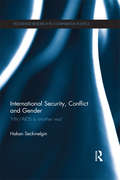- Table View
- List View
International Relations: Theories in Action
by Hubert Zimmermann Milena Elsinger Alex BurkhardtThe definitive applied theory textbook that helps you make sense of global issues through theoretical concepts. Not presupposing any prior knowledge, this introduction equips you with the skills to use theories as adaptable tools to tackle complex global issues. Adopting a critical and questioning approach, you will be equipped in theory as a series of tools to be used, adapted, combined, and applied when grappling with some of the most contested issues in global politics. Theoretical perspectives are brought alive as a vital tool to understand concrete historical and contemporary examples. This indispensable text starts by examining key theories spanning constructivism and postcolonialism to realism and liberalism with a real-world perspective which prioritises empirical purchase. From here, chapters take a critical, questioning approach to tackle core problems of international politics – from armed conflict and financial markets to the climate crisis, global inequality, gender and race. This text is the ideal companion for all undergraduate and postgraduate students of global affairs. Hubert Zimmermann is Professor of International Relations at Philipps University of Marburg, Germany. Milena Elsinger is Head of the student information department at Philipps University of Marburg, Germany. Alex Burkhardt teaches at the Bundessprachenamt in Koblenz, Germany and previously taught at Philipps University Marburg, Germany.
International Relations: Theories in Action
by Hubert Zimmermann Milena Elsinger Alex BurkhardtThe definitive applied theory textbook that helps you make sense of global issues through theoretical concepts. Not presupposing any prior knowledge, this introduction equips you with the skills to use theories as adaptable tools to tackle complex global issues. Adopting a critical and questioning approach, you will be equipped in theory as a series of tools to be used, adapted, combined, and applied when grappling with some of the most contested issues in global politics. Theoretical perspectives are brought alive as a vital tool to understand concrete historical and contemporary examples. This indispensable text starts by examining key theories spanning constructivism and postcolonialism to realism and liberalism with a real-world perspective which prioritises empirical purchase. From here, chapters take a critical, questioning approach to tackle core problems of international politics – from armed conflict and financial markets to the climate crisis, global inequality, gender and race. This text is the ideal companion for all undergraduate and postgraduate students of global affairs. Hubert Zimmermann is Professor of International Relations at Philipps University of Marburg, Germany. Milena Elsinger is Head of the student information department at Philipps University of Marburg, Germany. Alex Burkhardt teaches at the Bundessprachenamt in Koblenz, Germany and previously taught at Philipps University Marburg, Germany.
International Relations: Theory and Practice
by Kamal Kumar Nirmal JindalThis textbook is meant for undergraduate and postgraduate students of Political Science and International Relations International Relations: Theory and Practice critically analyses the evolution and changing nature of international relations as a discipline. It examines India's emergence as a major power in the 21st century, its strategic significance and its changing role in the international system. A must-have companion for all students of Political Science and International Relations, this new text provides the often marginalised Global South perspective on the issues and developments in international relations. Key Features: • Provides a holistic perspective covering International history, the Third World along with changing dimensions of India's foreign polic • Critically explores theoretical complexities of Marxism, Feminism and Neo-Liberalism in the Global South • Includes pedagogically rich content, which closely follows UGC course curriculum guidelines for the subject
International Reporting: The War in Iraq (The Washington Post Pulitzers)
by Anthony Shadid The Washington PostThe in-depth coverage of the Iraq War that earned Anthony Shadid of the Washington Post the Pulitzer Prize for International Reporting. On the eve of the war in Iraq, all news correspondents were ordered to leave Baghdad for the sake of their safety. Many streamed out. One man, instead, went deeper. At his own peril, Pulitzer Prize–winning reporter Anthony Shadid chose to stay, armed only with his convictions that the coming events would shake the Middle East to its core. What followed Shadid’s decision was insightful, honest, and compassionate reporting, straight from Baghdad. With exceptional bravery, he gave readers an honest and powerful view of the common Iraqi citizen’s experience of the war, as well as haunting coverage of the aftermath. With it, he succeeded in showing a profoundly human side of these events, and the new struggles that followed in its wake.
International Research on Multilingualism: Breaking with the Monolingual Perspective (Multilingual Education #35)
by Eva Vetter Ulrike JessnerThis volume contributes to a better understanding of both psycho- and sociolinguistic levels of multilingualism and their interplay in development and use. The chapters stem from an international group of specialists in multilingualism with chapters from Austria, Canada, Germany, Hungary, Israel, Italy, Slovakia, South Africa, Spain and the United States. The chapters provide an update on research on third language acquisition and multilingualism, and pay particular attention to new research concepts and the exploration of contact phenomena such as transfer and language learning strategies in diverse language contact scenarios. Concepts covered include dominant language constellations, mother tongue, germination factors and communicative competence in national contexts. Multilingual use as described and applied in the volume aims at demonstrating and identifying current and future challenges for research on third language acquisition and multilingualism. The third languages in focus include widely and less widely used official, minority and migrant languages in instructed and/or natural contexts, including Albanian, Arabic, Basque, English, French, German, Hungarian, Italian, Romanian, Spanish, Punjabi, Russian, Turkish, and Vietnamese, thereby mapping a high variety of language constellations.
International Research, Policy and Practice in Teacher Education: Insider Perspectives
by Jean Murray Clare Kosnik Anja SwennenThis unique book is an important source of information for all of those who educate future teachers and those who participate in teacher education as students, researchers, educators and policymakers. The volume also contributes to the international development of higher quality and research-led teacher education provision by providing clear evidence of policy impact. It draws on original research studies, conducted across eight countries in North America, Europe and Australia to analyse the impact of teacher education policy initiatives on ‘insiders’ in the fields, including education students, teacher educators and mentors in schools. In achieving this, the various chapters in the book analyse the commonalities and differentiations in the many policy reforms in teacher education currently being implemented by national governments. The book reveals some of the hidden consequences of these recent ‘reform’ efforts. It is also of use for leaders and policy makers in teacher education, providing them with insider perspectives from both theory and practice and making it possible for them to develop research-informed decisions that take into account the voices of insiders. Few texts have considered international policy trends alongside the impact they have had on significant stakeholder groups ‘inside’ teacher education. In redressing this omission, the book contributes to a better understanding of and improved practice of work in teacher education, both pre- and in-service.
International Residential Mobilities: From Lifestyle Migrations to Tourism Gentrification (Geographies of Tourism and Global Change)
by Josefina Domínguez-Mujica Jennifer McGarrigle Juan Manuel Parreño-CastellanoThis book assesses the drivers and impacts of new international residential mobilities by considering a range of mobilities in different countries across the globe from investment, amenity and retirement mobilities to those of the new global middle class and the transnational elites. It examines the intersection of these mobilities with the increase in the volume of global tourism, the advent of the sharing economy and peer-to-peer platforms, and the effects of transnational property investment. The consequent transformations are considered in urban environments where tourism pressure coexists with gentrification, increasing house prices and processes of social and ethnic segregation. By offering a broad perspective based on different case studies, the book portrays the contradictory consequences of international residential mobilities both favouring local opportunities for development and disrupting housing markets through the disassociation from local demand. As a result this book is a great resource for academics and students in tourism, urban and migration studies as well as policy-makers and practitioners involved in urban planning, social affairs and tourism management.
International Responses to Mass Atrocities in Africa: Responsibility to Protect, Prosecute, and Palliate (Pennsylvania Studies in Human Rights)
by Kurt MillsSince the end of World War II and the founding of the United Nations, genocide, crimes against humanity and other war crimes—mass atrocities—have been explicitly illegal. When such crimes are committed, the international community has an obligation to respond: the human rights of the victims outweigh the sovereignty claims of states that engage in or allow such human rights violations. This obligation has come to be known as the responsibility to protect. <P><P>Yet, parallel to this responsibility, two other related responsibilities have developed: to prosecute those responsible for the crimes, and to provide humanitarian relief to the victims—what the author calls the responsibility to palliate. Even though this rhetoric of protecting those in need is well used by the international community, its application in practice has been erratic at best.In International Responses to Mass Atrocities in Africa, Kurt Mills develops a typology of responses to mass atrocities, investigates the limitations of these responses, and calls for such responses to be implemented in a more timely and thoughtful manner. <P><P>Mills considers four cases of international responses to mass atrocities—in Rwanda, the Democratic Republic of the Congo, Uganda, and Darfur—putting the cases into historical context and analyzing them according to the typology, showing how the responses interact. Although all are intended to address human suffering, they are very different types of actions and accomplish different things, over different timescales, on different orders of magnitude, and by very different types of actors. <P><P>But the critical question is whether they accomplish their objectives in a mutually supportive way—and what the trade-offs in using one or more of these responses may be. By expanding the understanding of international responsibilities, Mills provides critical analysis of the possibilities for the international community to respond to humanitarian crises.
International Responsibility and Grave Humanitarian Crises: Collective Provision for Human Security (Global Politics and the Responsibility to Protect)
by Hannes PeltonenThis book examines responsibility in grave humanitarian crises, focusing on the international community's collective responsibility to take action in such cases as genocide or ethnic cleansing. The idea of collective responsibility highlights how we would like to see the global level primarily as something more akin to a community of peoples, rather than as a society of states in which other international and transnational actors operate. Since the acceptance of human rights, and in view of the atrocities of the Holocaust and other genocides, we have realized that some things concern us all: a realization that has led to the development of the responsibility to protect (R2P) framework. This book focuses on understanding the international community and its collective responsibility. Unlike the research frameworks put forward in other publications on this topic, the research model developed here does not distribute the collective responsibility to particular actors; instead, it sets out how the burden should be divided among those actors responsible in order to protect human security on a global scale. This book will be of interest to students of humanitarian intervention, the responsibility to protect, international law, peace and conflict studies, and international relations in general.
International Risk Sharing During the Globalization Era
by Akito Matsumoto Robert P. Flood Nancy P. MarionA report from the International Monetary Fund.
International Sanctions: Between Wars and Words (Cass Series on Peacekeeping #Vol. 21)
by Peter Wallensteen Carina StaibanoThe main theme of the book is that the new types of sanctions constitute a challenge to the international system. First, there are more of the targeted sanctions, including financial, travel, aviation, special commodity and arms sanctions. Furthermore, there are considerable but varied practices in implementation. Also there are now sanctions by new actors (regional bodies, international organizations). These all put new strains on international bodies in carrying out sanctions or getting member states to work together in these efforts. These challenges are analyzed in this volume, with some examples, but mostly from a generalist perspective. A completely novel aspect is that this volume also includes studies of the difficulties that are met by targeting actors, their way of managing the situations, and most interesting, the human rights of such actors.
International School Policy Development: Insights from China (Exploring Education Policy in a Globalized World: Concepts, Contexts, and Practices)
by Jian LiThis book investigates the international school policy reform in China from various perspectives. In recent years, international schools, international classes, international departments, and various international education projects have emerged in the field of education in China. This book explores and analyzes the idea of international schools, and discusses different aspects of the conceptual model of international education policy development in China, including international school policy, student cultivation, teacher cultivation, school management, curriculum, and quality assessment of international schools. In addition, this book offers a comprehensive, systematic, and practical perspective on shaping China’s international school policy development and management. This book serves as a guide for scholars and researchers who are interested, and work in, research on internationalization development in China, administrators, and stakeholders in China's education system, and graduate students who major or minor in the field of internationalization development in China.
International Science and Technology Education: Exploring Culture, Economy and Social Perceptions (The Earthscan Science in Society Series)
by Ortwin Renn Nicole C. Karafyllis Andreas Hohlt Dorothea TaubeEducation in science, technology, engineering and mathematics (STEM) is crucial for taking advantage of the prospects of new scientific discoveries initiating or promoting technological changes, and managing opportunities and risks associated with innovations. This book explores the emerging perspectives and methodologies of STEM education and its relationship to the cultural understanding of science and technology in an international context. The authors provide a unique perspective on the subject, presenting materials and experiences from non-European industrialized as well as industrializing countries, including China, Japan, South Korea, India, Egypt, Brazil and the USA. The chapters offer a wide scope of interpretations and comparative reviews of STEM education by including narrative elements about cultural developments, considering the influence of culture and social perceptions on technological and social change, and applying innovative tools of qualitative social research. The book represents a comprehensive and multidisciplinary review of the current status and future challenges facing STEM education across the world, including issues such as globalization, interdependencies of norms and values, effects on equity and social justice as well as resilience. Overall the volume provides valuable insights for a broad and comprehensive international comparison of STEM philosophies, approaches and experiences.
International Secretariats: Two Centuries of International Civil Servants and Secretariats (Global Institutions)
by Bob ReinaldaProviding a comprehensive overview of two centuries of international civil servants and international secretariats, this book reveals how international secretariats have emerged and evolved, focusing on both structures (international public administrations) and the practitioners (international civil servants). Reinalda explores the history and development of international secretariats and international civil servants, starting with the Congress of Vienna (1814–1815), when the first international organization was established in the form of a river commission for the navigation of the Rhine. Charting the development of international secretariats through the nineteenth century – the League of Nations, the United Nations, and the United Nations System with its many specialized agencies, the author explains why NATO (North Atlantic Treaty Organization) and the OECD (Organisation for Economic Co-operation and Development) have strong, rather than weak, international secretariats, and shines a light on the registries of international courts and tribunals. The book fills a gap in the literature by exploring the full evolution of international secretariats, covering global and continental developments as well as regional integration practices around the world. Secretariats have become the leading actors in multilateral diplomacy particularly for dealing with complex issues, and this book will be of interest to all scholars of global governance and practitioners working for a range of international organizations.
International Security Issues in a Global Age: Securing the Twenty-first Century
by Clive JonesThis volume examines the new, the changing, and the enduring features of international security in the post-Cold War era. In so doing, it examines the extent to which present state structures and institutions have been able to adapt and accommodate themselves to the diversity of security threats.
International Security Management: New Solutions to Complexity (Advanced Sciences and Technologies for Security Applications)
by Petra Saskia Bayerl Gabriele Jacobs Ilona Suojanen Kate E. HortonThis book offers a new look at international security management combining practical applications and theoretical foundations for new solutions to today’s complex security and safety challenges. The book’s focus on safety as a positive experience complements the traditional approach to safety as risks and threats. In addition, its multi-stakeholder, multi-disciplinary, international and evidence-based approach provides holistic and timely insights for the field. Topics raised in this book focus on the crucial questions of: Who is safety actually for? (and) How can sustainable safety solutions be jointly created? This book provides comprehensive insights into the latest research findings, practical applications and suggestions for dealing with challenges in international security management in integrated and sustainable ways, making it relevant reading for practitioners, as well as academics and students - with a view to obtaining thorough, first-hand knowledge from serving experts in the field. We explore new ways of working with citizens, police and policymakers in order to co-create safety. This book emphasises the importance of safety as a topic that matters for all.“Safety and security are basic pillars for the development of our society. However, the number of areas, actors and procedures involved in the management of the different elements composing the international security eco-system, its coordination and alignment, make it a challenging issue to resolve. This book provides a fresh new approach to this complex issue, in which we all have a role to play.”Fernando Ruiz, Acting Head of European Cyber-Crime Centre - Europol “A very timely analysis that brings a much-needed international perspective to the field of security management. The authors explore the challenges confronting security management in a complex and connected world and generate new ideas to support practice and inspire research.” Professor Mark Griffin; John Curtin Distinguished Professor, Curtin University; Director, Future of Work Institute “This book presents the role of International Security Management in the 21st century in an innovative way.”Dr. Christian Endreß, Managing Director, ASW Bundesverband - German Association for Security in Industry and Commerce
International Security Studies: Theory and Practice
by Peter Hough Andrew Moran Shahin Malik Bruce PilbeamThis new textbook provides students with a comprehensive and accessible introduction to the subject of security studies, with a strong emphasis on the use of case studies. In addition to presenting the major theoretical perspectives, the book examines a range of important and controversial topics in modern debates, covering both traditional military and non-military security issues, such as proliferation, humanitarian intervention, food security and environmental security. Unlike most standard textbooks, the volume also offers a wide range of case studies - including chapters on the USA, China, the Middle East, Russia, Africa, the Arctic, the Middle East, Europe and Latin America - providing detailed analyses of important global security issues. The 34 chapters contain pedagogical features such as textboxes, summary points and recommended further reading and are divided into five thematic sections: Conceptual and Theoretical Military Security Non-Military Security Institutions and Security Case Studies This textbook will be essential reading for all students of security studies and highly recommended for students of critical security studies, human security, peace and conflict studies, foreign policy and International Relations in general.
International Security Studies: Theory and Practice
by Peter Hough Andrew Moran Bruce Pilbeam Wendy StokesThis new and updated edition of International Security Studies provides students with a comprehensive introduction to the subject of security studies, with a strong emphasis on the use of case studies to illustrate theoretical debates. In addition to presenting the major theoretical perspectives, the book examines a range of important and controversial topics in covering both traditional military and non-military security issues such as WMD proliferation, humanitarian intervention, food security and environmental security. The volume also offers a wide range of case studies providing detailed analyses of important global security issues. The 37 chapters contain pedagogical features and recommended further reading and is divided into five thematic sections: • Conceptual and Theoretical • Military Security • Non-Military Security • Institutions and Security • Case Studies Updates for the second edition include: • New chapters on cybersecurity and the insecurity of the LGBT community • Substantial revisions to existing chapters to incorporate analysis of important international political developments including: the Trump Presidency; ‘Brexit’; North Korean nuclear standoff; the Syrian Civil War; Yemen Civil War; Mediterranean migration crisis; Climate change diplomacy and the Sustainable Development Goals. This textbook will be essential reading for all students of security studies and highly recommended for students of critical security studies, human security, peace and conflict studies, foreign policy and International Relations in general.
International Security Studies: Theory and Practice
by Peter Hough Andrew Moran Bruce PilbeamFully revised to incorporate recent developments, this third edition of International Security Studies provides students with a comprehensive and accessible textbook on security with a particular emphasis on the use of case studies to illustrate theoretical debates.In addition to presenting the major theoretical perspectives, the book examines a range of important and controversial topics in covering both traditional military and non-military security issues such as nuclear proliferation, humanitarian intervention, food security and environmental security. Unlike most standard textbooks, the volume also offers a wide range of case studies – including chapters on the US, China, the Middle East, Russia, East Africa and the Arctic – providing detailed analyses of important global security issues and the application of theoretical debates to major contemporary issues.The 36 chapters contain pedagogical features such as textboxes, summary points and recommended further reading, and are divided into five thematic sections: Conceptual and theoretical Military security Non-military security Institutions and security Case studies This textbook will be essential reading for all students of security studies and highly recommended for students of critical security studies, human security, peace and conflict studies, foreign policy and International Relations in general.
International Security Yearbook 1984/85
by Edward N. Luttwak Barry M. BlechmanInternational Security Yearbook 1984/85 presents an empirical and objective assessment of the events of the year 1984 and 1985 as they affect U.S. security. It seeks to contribute to the national debate on security policies.
International Security and Conflict (The Library of Essays in International Relations)
by Bruce RussettThis important collection of classic articles and papers presents a variety of perspectives on key topics in international security and conflict. These include how the structure of the international system constrains nations’ choices, how domestic politics may affect decisions on war and peace, how individual and small group behaviour can affect foreign policy, and how international organizations can affect the security of states and peoples. Some of the selections are classics, but most represent recent research and analysis. They draw on international scholars working from different kinds of theories (realist, liberal-institutionalist and constructivist) and research methods to ask why nation-states may fight violently or stay at peace.
International Security and Peacebuilding: Africa, the Middle East, and Europe
by Abu Bakarr BahThe end of the Cold War was to usher in an era of peace based on flourishing democracies and free market economies worldwide. Instead, new wars, including the war on terrorism, have threatened international, regional, and individual security and sparked a major refugee crisis. This volume of essays on international humanitarian interventions focuses on what interests are promoted through these interventions and how efforts to build liberal democracies are carried out in failing states. Focusing on Africa, the Middle East, and Europe, an international group of contributors shows that best practices of protection and international state-building have not been applied uniformly. Together the essays provide a theoretical and empirical critique of global liberal governance and, as they note challenges to regional and international cooperation, they reveal that global liberal governance may threaten fragile governments and endanger human security at all levels.
International Security and the Olympic Games, 1972–2020 (Palgrave Studies in Sport and Politics)
by Austin DuckworthDrawing on new archival documents and interviews, this book demonstrates the evolving role of international politics in Olympic security planning. Olympic security concerns changed forever following the terrorist attack on Israeli athletes at the 1972 Munich Olympic Games. The International Olympic Committee’s (IOC) choice to ignore security after the attack in Munich left individual Olympic Games Organizing Committees to organize, fund, and provide security for the major international event. Future Olympic hosts planned security amidst increasing numbers of international terrorist attacks, and with the Cold War in full swing. For some Olympic hosts, Olympic security now represented their nation’s largest ever military operations. By the time the IOC made security more of a priority in the early 1980s, the trends in Olympic security were set for the future.
International Security in the Asia-Pacific
by Alan Chong"In many ways, the S. Rajaratnam School of International Studies (RSIS) is a microcosm of the Singapore brand of government. The DNA of Singapore's policymaking is its forward-looking nature. S. Rajaratnam talked about the captain of the ship and the qualities of the 'Assabiya' while Lee Kuan Yew articulated his wish for leadership foresight and the admiration for 'helicopter quality' candidates in policymaking. This was how RSIS' mission began under the stewardship of the late President S. R. Nathan. RSIS began (as IDSS) in 1996 as a form of policymakers' clairvoyant on security matters. To date, it is Singapore's 'frontline' think tank on Asia-Pacific security, counter-terrorism, inter-religious dialogue and non-traditional security threats. The various contributors in this edited volume, Forward Engagement: RSIS as a Think Tank of International Studies and Security in the Asia-Pacific, have been stalwarts of the RSIS mission for the past 20 years. These are their reflections for posterity as well as their forward projections for their quasi-diplomatic and intellectual roles in the service of Singapore's national security"--
International Security, Conflict and Gender: 'HIV/AIDS is Another War' (Routledge Research in Comparative Politics)
by Hakan SeckinelginThis book challenges the conventional security-based international policy frameworks that have developed for dealing with HIV/AIDS during and after conflicts, and examines first-hand evidence and experiences of conflict and HIV/AIDS. Since the turn of the century international policy agenda on security have focused on HIV/AIDS only as a concern for national and international security, ignoring people’s particular experiences, vulnerabilities and needs in conflict and post-conflict contexts. Developing a gender-based framework for HIV/AIDS-conflict analysis, this book draws on research conducted in Burundi to understand the implications of post-conflict demobilization and reintegration policies on women and men and their vulnerability to HIV/AIDS. By centring the argument on personal reflections, this work provides a critical alternative method to engage with conflict and HIV/AIDS, and a much richer understanding of the relationship between the two. International Security, Conflict and Gender will be of interest to students and scholars of healthcare politics, security and governance.
